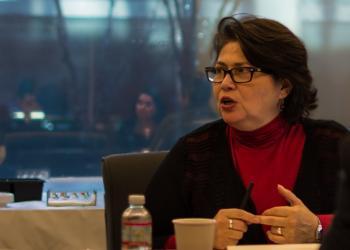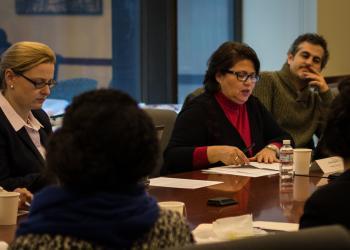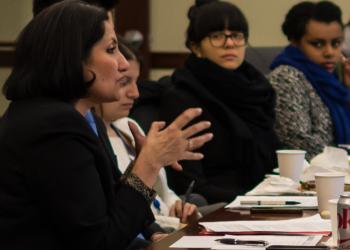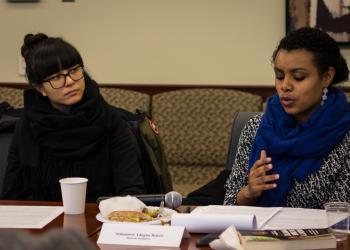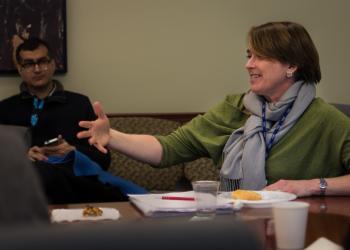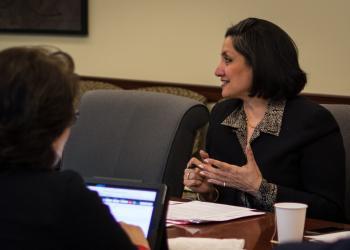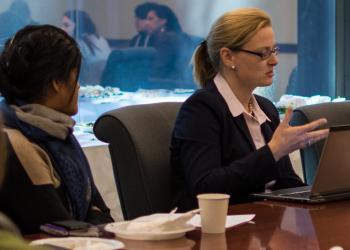Engaging with religious leaders can help address women's inequality: An ongoing conversation
UN agencies must begin to see religion as the solution instead of the problem as they promote gender equality.
One framework for that could be the UN Charter, which calls for non-discrimination on gender and religion.
And even in cultures where patriarchal religious traditions foster discrimination against women, religious belief still has the power to unlock human potential and, even, to empower women.
These were among the ideas expressed during a conversation among diplomats, UN officials, and civil society representatives at the offices of the Baha’i International Community (BIC) on 13 January 2015.
Sponsored by the BIC, UN Women, the United Nations Population Fund (UNFPA), and World YWCA, the event was part of a series on the “intersection of gender equality and religion” across the life cycle of the human being. The January gathering focused on how religious messages impact women and men in adulthood.
The conversation was opened after UNICEF partnership specialist David Ponet discussed some of the difficulties faced by his organization in promoting gender equality while working with religious groups that are patriarchal in their orientation.
The fact that the leaders of many religious organizations are male “signals inequality,” he said. Yet religious groups often “provide health and other services far better and more extensively than the state does.”
In his view, the answer is to “engage” with traditional and religious leaders to discuss and try to change cultural norms that discriminate against women.
"While religion is part of the problem, it is also part of the solution," said Mr. Ponet.
Rosa Lizarde, global coordinator of the Feminist Task Force of the Global Call to Action against Poverty, said recent studies by the UN said gender-based discrimination remains the “single-most widespread driver of inequality in the world.”
Traditional religious views play a role in this, she said, but religious messages can also play a role in reversing inequality, noting that many sacred texts – especially in ancient cultures – revere women.
At the same time, she said, the UN Charter itself might be used to lay the foundation for greater equality.
“The UN charter talks about ‘respect for human rights and for fundamental freedoms for all without distinction as to race, sex, language, or religion,’” said Ms. Lizarde.
Selamawit Adugna Bekeleo, a youth respondent from Ethiopia, said she believes that religious belief often empowers women, despite the patriarchal hierarchy of many faith groups.
She cited the story of Leymah Gbowee, who led a women’s peace movement that helped end the Second Liberian Civil War and won the Nobel Peace Prize for her activities.
Ms. Gbowee was in an abusive relationship with her husband, who used Bible quotes to force her to stay married to him.
But, said Ms. Bekeleo, Ms. Gbowee “used her faith and her network at church to get out of that relationship, to empower herself and empower thousands of Liberian women that lead to the Liberian mass action for peace.”
Elizabeth Nash of the World YWCA (Young Women’s Christian Association) agreed that religious belief has the capacity to empower women.
“Within the Christian faith, YWCAs around the world are seen as a safe space for young women to go and question discrimination,” said Ms. Nash, saying that enables them to “become strong local leaders, strong local voices.”
The ambassador from an African country said men should be listening to the messages offered by women at meetings such as this. “You have a situation [in many countries] where women have no power, and are impacted negatively by culture.”
“Men should be listening to these messages,” he said, saying he hoped the women at the meeting were not mainly “talking to themselves.”
“If men and women are going to continue to live together, it means we must engage the men very seriously,” he said.
Nika Saeedi, a policy specialist on gender, political process, and peacebuilding at the United Nations Development Programme (UNDP) said too often UN agencies, in their internal discussions, focus only on the negative aspects of religion, such as extremism.
“But we have to have a broader understanding of the role of religion and gender equality and social relations,” she said. “I wish more UN colleagues would attend meetings like this.”
Bani Dugal, principal representative of the Baha’i International Community to the United Nations, said the goal of the meeting was to encourage a sophisticated discourse which welcomes a variety of perspectives and experiences in order to seek appropriate solutions that can help reverse negative messages that perpetuate inequality and exclusion,
“Religion plays a powerful role in everyone’s life whether one is a believer or not,” said Ms. Dugal. “We see religion as an ongoing process through which humanity becomes conscious of the spiritual dimension of human life and learns to orient its individual and collective life accordingly.
“At the core of religion is a set of spiritual principles, which together, form a common heritage of humankind. The role of religion as a shaper of culture and community has been increasingly acknowledged by the UN,” said Ms. Dugal.
